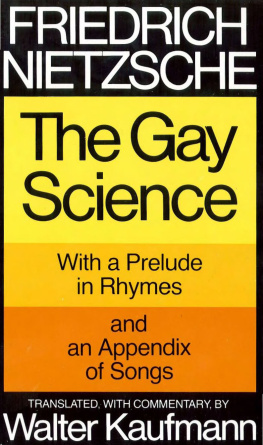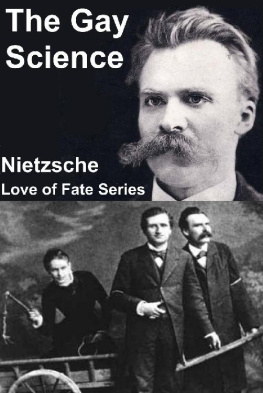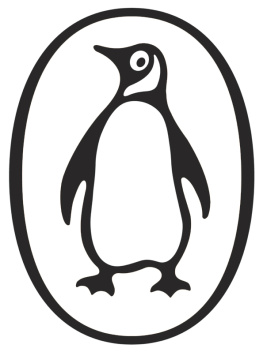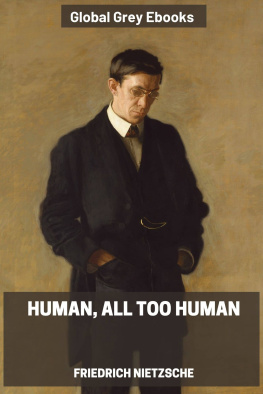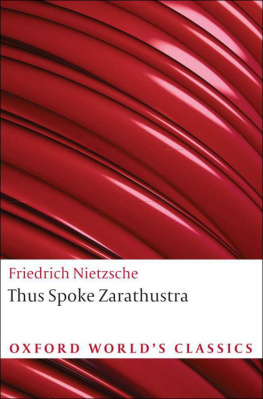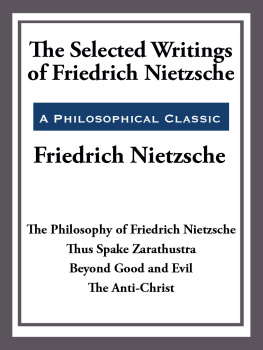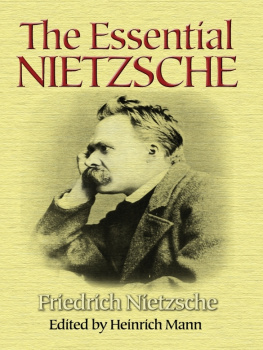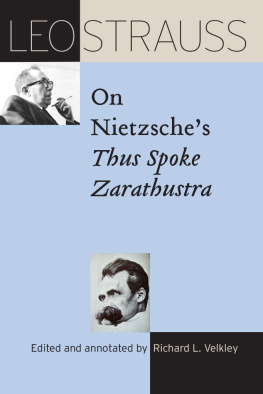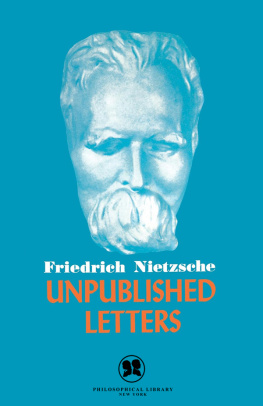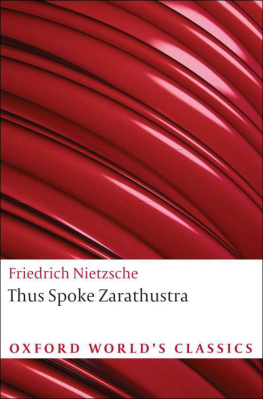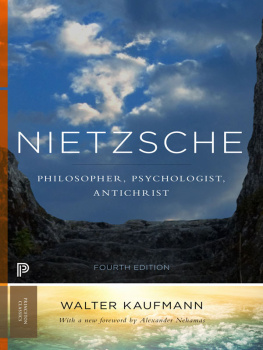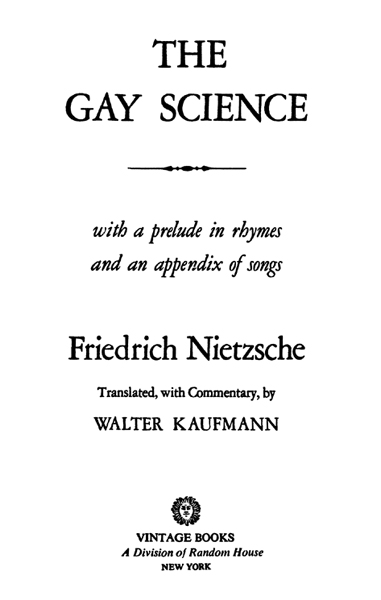VINTAGE BOOKS EDITION, March 1974
Copyright 1974 by Random House, Inc.
All rights reserved under International and Pan-American Copyright
Conventions. Published in the United States by Random House, Inc.,
New York, and simultaneously in Canada by Random House of Canda
Limited, Toronto. Originally published by Random House, Inc., in 1974.
Library of Congress Cataloging in Publication Data
Nietzsche, Friedrich Wilhelm, 1844-1900.
The gay science.
This translation is based on the second edition of
Die frouhliche Wissenschaft, published in 1887.
1. Philosophy. 2. Man. 3 ReligionPhilosophy
4. Power (Philosophy) 5. Ethics. I. Kaufmann,
Walter Arnold, tr. II. Title
[B3313 F72E5 1974b] 193 73-10479
eISBN: 978-0-307-43417-3
v3.1_r2
For
MY JOYFUL SOPHIA
Abbreviations
BWN: Basic Writings of Nietzsche, Translated and Edited, with Commentaries, by Walter Kaufmann. The Modern Library, Random House, New York, 1968. This volume contains The Birth of Tragedy, Beyond Good and Evil, On the Genealogy of Morals, The Case of Wagner, and Ecce Homo, as well as additional selections.
VPN: The Portable Nietzsche, Selected and Translated, with an Introduction, Prefaces, and Notes by Walter Kaufmann. The Viking Press, New York, 1954. This volume contains Thus Spoke Zarathustra, Twilight of the Idols, The Antichrist, and Nietzsche contra Wagner, as well as additional selections.
Kaufmann: Walter Kaufmann, Nietzsche: Philosopher, Psychologist, Antichrist. Third Edition. Princeton University Press, Princeton, 1968, and Vintage Books, Random House, New York, 1968. Nietzsche Bibliography on pp. 477-502.
NOTE : Arabic figures after these three abbreviations refer to pages in these editions.
The Will to Power, Edited, with Commentary, by Walter Kaufmann, Vintage Books, Random House, New York, 1968, is cited by referring to the numbers of the 1067 notes.
CONTENTS

Joke, Cunning, and Revenge:
Prelude in German Rhymes
Translators Introduction
The Gay Science is one of Nietzsches most beautiful and important books. Why then, it may be asked, has it not been made available in English before this, except for a single inadequate translation published before World War I that even had the title of the book wrong?
The Prelude in German Rhymes and the Appendix of Songs must have led many a would-be translator to wonder whether they could be done in English, and a look at the old version suggested that they might well be untranslatable. If you give up Nietzsches meters and rhymes in order to produce a literal version, the whole spirit and tone of this book are betrayed; if you give up Nietzsches meaning, if only now and then, the reader is led astray; and if you simply omit the Prelude and Appendix, a substantial part of the book is left out.
This may help to explain the fate of the book in English, and why the first translator left it to two others to furnish the poetry versions. Now that interest in Nietzsche has become widespread, this book can no longer be ignored. Here, then, is a new translation; and in fairness to Nietzsche, the original German rhymes and songs are furnished on facing pages.
The Title
The first English translation was entitled The Joyful Wisdom, which quite misses Nietzsches meaning. Wissenschaft means science and never wisdom. He himself had called his book:
Die
frouhliche Wissenschaft.
(la gaya scienza)
In my Nietzsche (1950) I therefore referred to the book as The Gay Science. I continued to use this title in subsequent publications; many other Nietzsche scholars followed suit; and by now this is the way the book is generally cited.
Meanwhile, the word gay has acquired a new meaning, and people are beginning to assume that it has always suggested homosexuality. But even in the early 1960s that connotation was still quite unusual. Standard dictionaries did not list it at all, while Eric Partridge, in the Supplement of A Dictionary of Slang and Unconventional English (1961), listed gay boy. A homosexual: Australian: since ca. 1925, with no literary occurrence before 1951and gay girl; gay woman. A prostitute
Under the circumstances, one might give up the title The Gay Science and resort to The Cheerful Science. But in the first place frhlich means gay, while heiter means cheerfula word that also has a prominent place in the book, but not in its title. Secondly, Nietzsches subtitle suggests forcibly that The Gay Science is what is wanted. Finally, it is no accident that the homosexuals as well as Nietzsche opted for gay rather than cheerful. Gay science, unlike cheerful science, has overtones of a light-hearted defiance of convention; it suggests Nietzsches immoralism and his revaluation of values.
Superficially, the parallel extends even further: Nietzsche says some very unkind things about women, and he extols friendship and the Greeks. But it is to be hoped that the title of this book will not be misconstrued as implying that Nietzsche was homosexual or that the book deals with homosexuality.
What Nietzsche himself wanted the title to convey was that serious thinking does not have to be stodgy, heavy, dusty, or, in one word, Teutonic. The German Wissenschaft does not bring to mind onlyperhaps not even primarilythe natural sciences but any serious, disciplined, rigorous quest for knowledge; and this need not be of the traditional German type or, as Nietzsche is fond of saying in this book, northern; it can also be southern, by which he means Mediterraneanand he refers again and again to Genoa and the Provence. Those who cannot readily understand Nietzsches feelings for the south should think of another Northerner who discovered the Provence at the same time: Van Gogh.
It was in the Provence that modern European poetry was born. William IX, Count of Poitiers around 1100 A.D., is said to be the poet whose verses are the oldest surviving lyrics in a modern European language. He was followed by other, greater troubadours of which the most famous are probably Bertran de Born (1140-1215) and Arnaut Daniel, his contemporary. Both are encountered in Dantes Inferno (Cantos 28f.); Bertran de Born is also the hero of two remarkable German poems, one by Ludwig Uhland, the other by Heinrich Heine.duly lists The gay science (= Pr[ovenal] gai saber): the art of poetry.
Nietzsche, of course, meant not only the art of poetry; but he definitely meant this, too, and therefore began his book with the Prelude in German Rhymes and later, in the second edition, added the Appendix of songs. In the last poem we even encounter the troubadours. It is also of some interest that in Beyond Good and Evil Nietzsche says that love as passionwhich is our European specialty was invented by the Provenal knight-poets, those magnificent and inventive human beings of the gai saber to whom Europe owes so many things and almost owes itself (section 260, BWN, 398).
In the section on The Gay Science in Ecce Homo, Nietzsche says specifically that the songs in the Appendix, written for the most part in Sicily, are quite emphatically reminiscent of the Provenal concept of

